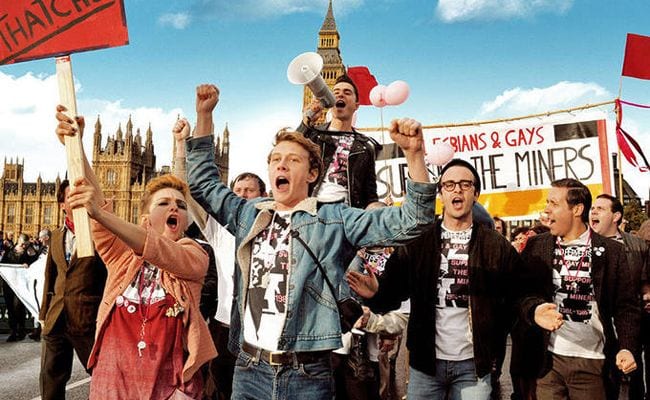
The year is 1984. For young Joe (George MacKay), few things would be more devastating than having his family find out he is gay. However, this doesn’t prevent him from joining the London Gay Pride march, as he figures out the likelihood of his suburban parents ever seeing him there is quite improbable. His nerves cease once he realizes how easily he is welcomed into this community, and shortly after he finds himself joining a group of activists at a small bookshop owned by Gethin (Andrew Scott), who lives with actor Jonathan (a scene-stealing Dominic West). The activists led by idealistic Mark (Ben Schnetzer) and Mike (Joe Gilgun) are trying to find a way for their cause to become more prominent and visible, and realize the only way to do so might be to form an alliance with another minority.
Their brainstorming leads them to center on one specific cause: British miners. More specifically, they decide to raise money for the families of miners taking part in the 1984 strike. First, however, they have to make sure the miners will accept their help. How could they not? After all, despite their apparent differences, both the miners and gays/lesbians had a common enemy: Prime Minister Margaret Thatcher. Sadly for them, the National Union of Mineworkers rejects them because of their sexual orientation. Never ones to give up so easily, the LGSM (Lesbians and Gays Support Miners) decides to target a specific mining community in South Wales.
Initially, the conservative community, led by Dai (Paddy Considine), has a hard time accepting help from LGSM, but after seeing that the group brings real money and not the ruffles and sequins they were expecting, the villagers open up to them, setting the tone for a very British, very bittersweet comedy in the vein of Billy Elliot and The Full Monty. Pride could have easily been a tearjerker or a lazy inspirational tale about how we’re all one and the same; instead, like the LGSM, it forgoes all facile sentimentality and chooses to concentrate not on eradicating differences, but in uniting through celebrating diversity. As the LGSM shows the miners, its strength comes not from the fact that its members are all the same, but rather that their unique skills helps make them stronger as a group.
In one of the film’s most delightful scenes, Jonathan shows the miners’ wives how to disco along to Shirley and Company’s “Shame Shame Shame”. Here one can feel the tension thicken as the sexy man struts on the dancefloor and then seduces the women, the camera angles almost teasing us about the prospect of something terrible about to happen. But then, when nothing disastrous happens, we’re allowed to sigh in relief as we see the stubborn men approach Jonathan to ask him for dance lessons. It’s one of the many unique moments that makes Pride such a remarkable little gem.
Directed by Matthew Warchus from a screenplay by Stephen Beresford, Pride is the rare crowdpleaser that gives audience members more to think about once they’ve had time to wipe away their tears or stop smiling after the film is over. While Warchus celebrates the beauty of his characters, he’s too smart a filmmaker to pretend that one inspirational story is enough to cancel out all the intolerance in the world. The film in fact, doesn’t have a happy ending, which is no spoiler given that it’s a well known fact that Thatcher eventually had her way with the miners.
What shouldn’t be denied though, is the fact that stories like that of LGSM did exist; it’s a mystery that no one had made a film about them before. If only for one historical moment, the organization allowed for a sense of community and joy to change the outlooks of people who were living on the edges of society. Warchus efficiently directs his ensemble and dares to not even give his film a protagonist, in continuing with the sense of building community.
Other notable performers in the ensemble include Bill Nighy and Imelda Staunton, who are moving beyond words. The film gives them all a chance in the spotlight, which would make discussing each and everyone of them counterproductive since it would go against the concept the film is trying to enforce. In terms of ideas and execution, Pride couldn’t be more alive and organic if it tried.
The film is presented in a Blu-ray edition with a terrific high definition transfer that certainly helps highlight the beauty of the landscapes in South Wales, not to mention the precision of the costume design and art direction. Bonus features are limited to six deleted scenes, some of which are just extended versions of scenes in the final cut, and a behind the scenes featurette.


![Call for Papers: All Things Reconsidered [MUSIC] May-August 2024](https://www.popmatters.com/wp-content/uploads/2024/04/all-things-reconsidered-call-music-may-2024-720x380.jpg)



